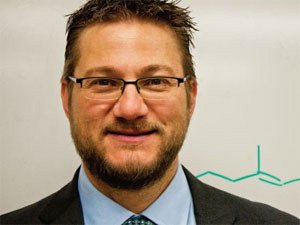Harnessing the power of proteins: Mark Distefano

Science seldom fits neatly into organized disciplines. The same applies to scientists. Transcending the boundaries of disciplinary research, Distinguished McKnight University Professor Mark Distefano combines chemistry and biology to defeat cancer cells, create methods for “green” chemical synthesis, and more.
Currently, Distefano is making connections on how proteins make connections. His group has created new chemicals, through protein prenylation, that can be used to control the behavior of cells. These powerful proteins can activate a molecule or other agent in the human body to make disease treatment more precise.
“I’m a chemist interested in biological problems,” he says. “We make molecules. We’re molecular engineers.”
Working out of a cozy room in Smith Hall, Distefano says his biggest struggle isn’t keeping up with the requirements of his students, his research or his involvement in professional groups. Rather, it’s finding the time to do it all, while still getting some sleep.
Illuminating cancer research
Imagine a drug, containing inactive proteins, that could be switched on using light. Distefano has discovered inhibitors that can slow or stop the growth of cancer cells. Much like how a flashlight shines through your hand in a dark room, long wavelength light can pass through human tissue, activating these cancer-battling inhibitors.
Distefano is also working to design protein-based catalysts, using less energy and producing less waste. By artfully combining pure chemical processes with processes using natural enzymes, he can create catalysts that function at unprecedented rates. This results in cleaner, more efficient production of chemicals for everything from medicines to plastics.
Now in his 20th year at the U of M, he will put the McKnight award to good use. He’ll continue to support graduate students and post-docs in his lab, while also bringing undergraduates into the mix. He hopes the money will enable him to spend more time traveling to meetings with scientists from across disciplines: a practice that has proven beneficial thus far.
“I’ve learned to be very collaborative — not to be afraid to call people up and work together. Not to be afraid to explore topics I don’t know a lot about.”
Legacy of knowledge
When he's not advising his students or writing scientific papers, Distefano loves to cook, do woodworking, make his own ammunition to hunt with, and spend time with his wife, three children and three dogs. The grandchild of a hunter/trapper and a strawberry farmer — and the son of an engineer and a nurse — he has inherited a love of science and nature.
“My parents made it clear that knowledge was important and valued. I knew I’d be a scientist as a freshman in high school. I liked the problems of biology, but I preferred the methods of chemistry because they give you more precise answers.”
Photos by Andria Peters
Republished with permission from Research @ the U of M, a publication of the Office of the Vice President for Research.
